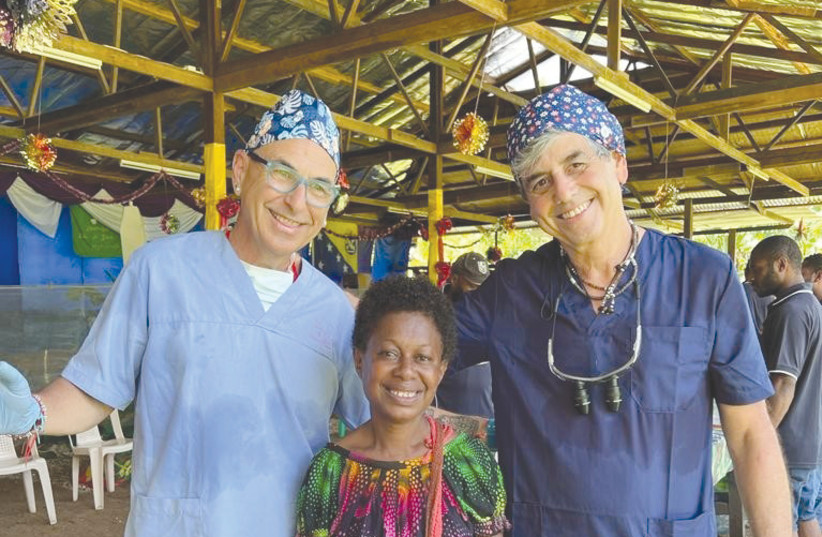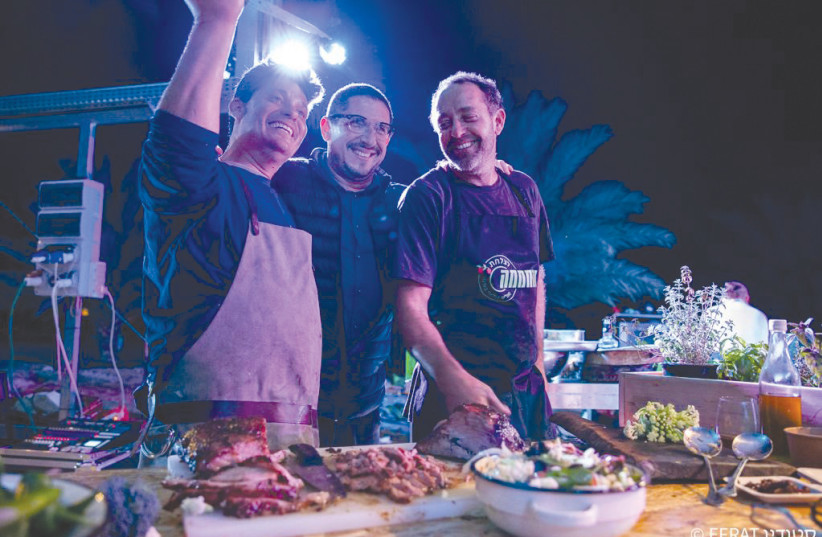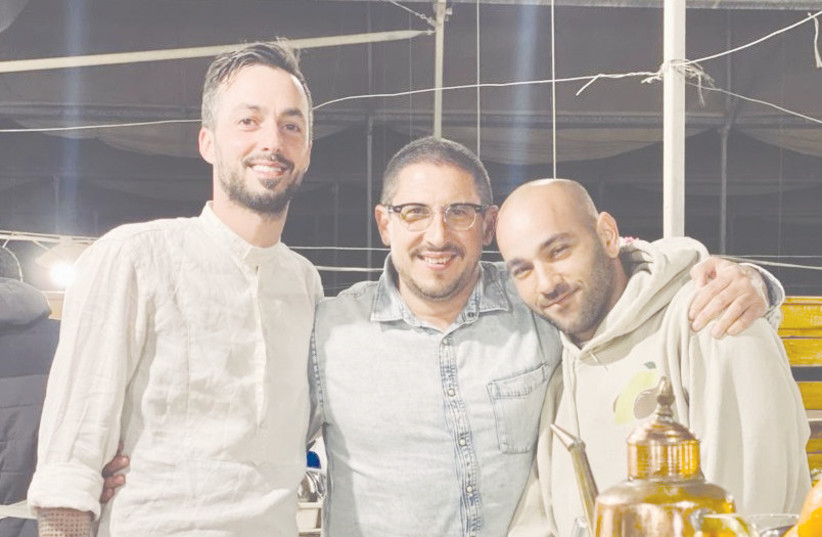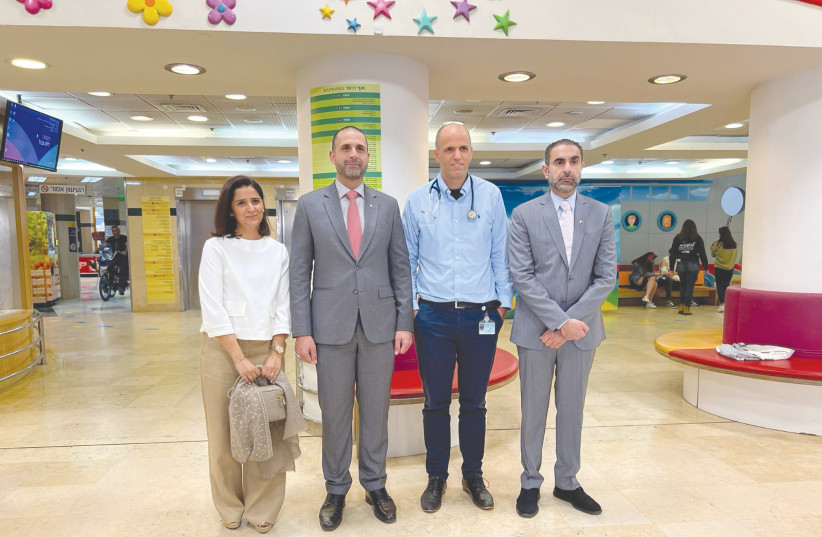The revised humane policy introduced this week by Interior Minister Ayelet Shaked with regard to Ukrainian refugees brings to mind the late Bialystok-born Leo Fink, who together with his brothers settled in Melbourne and became a very successful businessman.
Fink, who was the maternal grandfather of Mark Regev, Israel’s former ambassador to the United Kingdom, who is now, inter alia, a contributor to the weekend edition of The Jerusalem Post, was very community-minded, and held a number of important positions in community organizations. He was particularly concerned about saving Jews from the Nazis, and after the Second World War facilitated the immigration of Holocaust survivors to Australia.
He formed a close relationship with Arthur Calwell, who was immigration minister in the government of Labor leader Ben Chifley, whom he badgered to allow unrestricted immigration of refugees who had survived the Holocaust.
In the final analysis, Calwell agreed, providing they had relatives in Australia who would take care of them and pay a deposit of £50 for their entry.
In those days, this was a huge sum, as the average weekly wage was around £2 or £3. But Fink was also a talented fundraiser, in addition to which he contributed a lot from his own pocket.

When a ship with Holocaust survivors was due to arrive, he would present himself at Jewish homes on the evening prior to the arrival date, put £50 on the table and brief the head of the household with details of his or her new “brother” or “sister,” with instructions to be at the port for the “reunion.”
From 1943 to 1947, Fink headed the United Jewish Overseas Relief Fund to aid Holocaust survivors, and it became one of the largest Jewish organizations in Australia.
Many of the survivors were educated and were able to contribute to Australia in different ways. Others proved to be astute and highly successful business people, who gave back to the country that took them in by contributing to a variety of cultural and social welfare causes within and beyond the Jewish community.

Australia is known as the Lucky Country. For most Holocaust survivors who landed there, it was, and they helped to keep it that way. Ukrainian refugees who remain in Israel may contribute to Israel being the Lucky Country of the Middle East.
■ FULL-PAGE advertisements that the Ukrainian World Congress placed in both the Hebrew and English editions of Haaretz last Friday contained the names of some 180 Nobel Prize laureates who support Ukraine and note that there is always a peaceful way to resolve disputes.
Most of the living Israeli laureates were signatories to the declaration of support. Conspicuously absent were Robert Aumann, Daniel Kahneman and Joshua David Angrist. The latter two live in America and are dual nationals, and it’s possible that the organizers of the advertisement didn’t get to them.
■ IT STANDS to reason that the majority of Israelis believe in allowing Ukrainian refugees – Jewish or otherwise – to enter the country, albeit for a limited period of time.
In the case of those who identify as Jewish even though they may not qualify halachically, Finance Minister Avigdor Liberman proposes mass conversion, which would solve a lot of problems and cut reams of red tape.

But if there are going to be mass conversions, let’s have a free-for-all and include everyone in Israel who has Jewish DNA but doesn’t have a Jewish mother. Think of all the heartbreak it would save.
But let’s not limit conversion to former Soviet citizens or present-day Russians and Ukrainians. Let’s include Ethiopians who have a question mark hovering over their Jewishness. And if accepting first-degree relatives of Ukrainian immigrants who already have Israeli citizenship is acceptable, how about extending that policy to Ethiopians who have been waiting for years for Israel to keep its promise.
One can only imagine how frustrating it is for Aliyah and Integration Minister Pnina Tamano-Shata, who was born in Ethiopia and came to Israel as a child, not to be able to greet a plane carrying immigrants from Ethiopia, most of whom have satisfied numerous Israeli officials that they are not only Jewish but religiously observant. There is no excuse for denying them the right to be reunited with their relatives and to live in Israel.
■ AS HAS been mentioned previously in this column, it is very difficult for President Isaac Herzog to go to places, both inside and outside of Israel, without some reminder of one or more members of his family.
Last week when he was in Turkey, at the Neve Shalom Synagogue, which is the largest Sephardi synagogue in Turkey, he recited kaddish for his mother, who died in January this year, and recalled the individual historic visits to Turkey by his father and grandfather. He also inspected a shofar that his father had presented to the synagogue.
Other than in ultra-Orthodox Israeli synagogues, where all the kippot are black, one sees a variety in color, style and texture, but at Neve Shalom everyone, including Herzog, wore white, though to be honest they were souvenir kippot with a relevant text and illustrated reminder of Herzog’s visit to Turkey.
This week, Herzog was in Safed for the naming of a street in memory of his grandfather whose name he bears. Herzog toured the city with Mayor Shuki (Yehoshua) Ohana, and at the street-naming ceremony said that he had a feeling that both his grandfather and his father would have been greatly moved by the ceremony because each of them loved Safed.
■ IN A recent tweet from Washington, Marek Magierowski, Poland’s former ambassador to Israel, who is currently his country’s ambassador to the US, recommends six books about Russian President Vladimir Putin, stating: “I’ve read all of them, and I still don’t understand him. But you can give it a try.”
■ JERUSALEMITES WHO have been invited by Irish Ambassador Kyle O’Sullivan and his wife to join them in celebrating Saint Patrick’s Day are in a bit of a bind. Whereas the reading of the Scroll of Esther takes place on Wednesday night in the rest of the country, in Jerusalem and in all walled cities, it is on Thursday night, which is when the Saint Patrick’s Day reception will take place. Traditionally in Israel, it is celebrated with Irish whiskey and Irish beer.
Jerusalemites who have been invited to the Saint Patrick’s Day event need not miss out on hearing the reading of the Scroll of Esther. Chabad of Rehavia, as is the case every year, has arranged readings every hour on the hour, between 6 p.m. and 11 p.m., in open spaces next to 52 King George Street, Rehavia; Ohel Aharon Synagogue, 29 Charlap Street, Kiryat Shmuel; Gerard Behar Center, 11 Bezalel Street, downtown; and Tiferet Menachem at 29 Yitzhak Barashi Street, Nahlaot. There will also be hourly readings on Friday, from 9 a.m. to 2 p.m., at many more venues. To ascertain where they are, go to www.AzzaZaza.com or telephone (02) 800-1717.
■ LAST WEEK Australian Ambassador Paul Griffiths, together with Australian Defense Attaché Group Captain Louise desJardins, hosted an International Women’s Day event for women from diverse sectors, including hi-tech, government, defense, academia and diplomacy. The idea was to provide a platform for women to network and to discuss some of the obstacles that women still need to overcome.
Yellow is one of Australia’s national colors, representing the national flower, wattle, which strongly resembles mimosa. The yellow has generally been paired with green, though neither color appears on the national flag. At the IWD reception, the yellow was paired with blue in the cushions on the sofas, a factor that Griffiths acknowledged was a sign of sympathy with Ukraine.
In the brief speech that he made, Griffiths underscored that gender equality is high on Australia’s national agenda, particularly that of Australian Foreign Minister Marise Payne. Griffiths quoted several Australian and Israeli statistics related to gender equality, and it appears that they have the upper hand Down Under.
Among the women diplomats in attendance were several ambassadors, including Lisa Stadelbauer of Canada, Anne Dorte Riggelsen of Denmark, Margarita Eliana Manjarrez Herrera of Colombia, Pannabha Chandraramya of Thailand and Helen Deller Klein of Ecuador.
There are several more embassies headed by women, but there were so many IWD events last week that they couldn’t attend all those to which they were invited.
Klein is excitedly awaiting the state visit of Ecuador’s President Guillermo Lasso in May. He had been hoping to come to Israel in January, but fears about Omicron got in the way, and the visit was postponed. Lasso has previously been to Israel in a private capacity.
■ WORLD WIZO president Esther Mor, who was also at the Australian reception, and who happens to be a close friend of Klein, will miss out on meeting Lasso, as she will be in Los Angeles, where she has been officially invited to join Israel Consul-General Dr. Hillel Newman in celebrating Israel Independence Day.
The Consulate-General in LA is among Israel’s largest in the world. From Mor’s perspective, LA is also important in that it has a large and extremely active branch of WIZO, so even though she might be enjoying herself in California, she will also be working, because a WIZO woman’s work is never done.
■ WHEN THEY’RE out to get you, they’ll pounce on anything. Billionaire philanthropist and international businessman Roman Abramovich received Portuguese citizenship in December 2021, at which time he was not yet embroiled in the crackdown on Russian oligarchs. Now the Portuguese have mounted an inquiry into his eligibility, given that Abramovich is an Ashkenazi surname, and the citizenship was given to people who could prove descent from Jews expelled from Portugal at the end of the 15th century.
People expelled from Spain and Portugal, or those who fled rather than convert to Christianity, moved to different parts of the world, and in some cases their descendants kept moving and intermarried with both Ashkenazim and non-Jews along the way. It is possible that this is what happened in the case of Abramovich’s forebears.
When he reluctantly put the Chelsea Football Club on the market, he announced that proceeds of the sale would go to all those injured in the war between Russia and Ukraine. But CBC has been sanctioned along with his other assets. In freezing Abramovich’s assets in the UK, the British government has in a sense bitten off its nose to spite its face. If the proceeds of the sale were going to help the injured on both sides, the British government is denying injured people that aid. Abramovich did not differentiate between injured civilians and injured military personnel. The money was intended for all.
Lots of people were close to Putin before he embarked on this vicious attack on Ukraine, but that doesn’t mean that all the oligarchs financed the army or that they all agree with Putin’s aggression.
Of course, once the war is over, the assets will come out of deep freeze, and many organizations and institutions that have severed contact with the oligarchs will return for handouts. No one should be surprised if the answer is “nyet!”
■ JUST AS a matter of interest, Chabad Rabbi Berel Lazar, who is also known as the chief rabbi of Russia, enjoys a close friendship with Putin. Should Lazar also become persona non grata, or should he be recruited into the army of would-be mediators to use whatever influence he has to try to bring the war to an end?
■ WHILE VARIOUS Israeli government ministers, including Prime Minister Naftali Bennett, were focusing attention on Ukrainian children arriving in Israel, Khaled Al Jalahma, the ambassador of Bahrain, was learning about medical treatments given to Israeli children who are hospitalized in Safra Children’s Unit of Sheba Medical Center, Tel Hashomer.

Jalahma, who was accompanied by his wife, Nouf Ali Al Khaja, and his deputy Abdul Karim Al Ansari, met with Sheba Director-General Prof. Yitshak Kreiss, pediatrician Dr. Moshe Ashkenazi, who is the deputy director of the Safra Children’s unit; and Prof. Raz Somech, director of pediatrics and director of pediatric immunology.
The trio from Bahrain toured the Safra unit, where they saw the educational facilities for child inpatients, equipment for children with mobility problems, and the music room. The ambassador aims to learn as much as possible about Israel in order to determine in what areas there can be significant cooperation between Bahrain and Israel.
■ AS HAS been widely publicized, some Israeli medical personnel have been working in Ukraine and neighboring countries to help refugees, and approval has been given to set up an 80-member field hospital in Ukraine.
At the same time, two Israeli dentists have gone in the opposite direction, and traveled to Papua New Guinea, after learning that a large swath of the population has severe dental problems.
To help remedy the situation and improve the indigenous smiles, doctors Roni Amid and Doron Keren took a three-week break from their private practice to volunteer their services in PNG in conditions that were a far cry from their pristine premises in Israel, but their PNG patients were delighted with the treatments they received from the Holy Land doctors.
■ THERE ARE also Israelis who are desperately in need of dental treatment. JNF-UK, which supports various projects in Israel, this year decided to help impoverished residents of Acre who have severe dental problems. Through its Green Sunday telethon at the end of last month, it raised considerable funds to support the Acre Community Dental Clinic, which offers a vital service helping patients who cannot afford dental care to receive essential treatment.
The JNF-UK phone team, headed by Dr. Shai Bezalely, CEO of JNF-UK, received support from actors participating in its sponsored 2022 Festival of Ivrit. This festival is part of the organization’s broader program to support UK schools in enhancing their Israel education syllabus and strengthening student connections to Israel.
Or Meir, who plays the role of the King in The Emperor’s New Clothes, one of this year’s plays, said: “Ha’sha’ah Theater is delighted to participate in JNF-UK’s Green Sunday Appeal to help raise funds for those in need in Israel’s peripheries.”
The appeal was conducted with the reminder: No teeth. No eating. No health. No confidence. No job.
■ OF THE cities that have a mixed Arab-Jewish population, Haifa arguably has the best record, so it comes as no surprise that a conference on politics and Arab society that is being held next week, March 20-22, will take place in Haifa under the joint auspices of the University of Haifa, the Israel Democracy Institute and the New Israel Fund. The exact venue is the university’s Hecht Auditorium.
It is heartening to the see the number of Arab academics, lawyers and representatives of NGOs who are listed among the speakers in every session.
However, what is surprising is the paucity of Arab politicians among the participants. One would expect to see the name of Mansour Abbas, the head of the Ra’am Party, who is a member of the government coalition. But no, it isn’t there. The only Arab politician is MK Ayman Odeh, who heads the Joint List and who is scheduled to be the final speaker on Tuesday.
■ TEL AVIV-JAFFA is also a mixed city. This week, with the participation of Mayor Ron Huldai, a street was named in memory of Nadia Hilou, a former Labor MK and social worker.
Born in Jaffa, Hilou, who was the second female Arab MK and the first female Christian Arab MK, was also deputy chairwoman of Na’amat, and director of the Status of Women Division in what was then the Union of Local Authorities.
She fought strongly for women’s rights within the Arab community, for the protection of children from sexual predators in the general community, and initiated legislation for compensation to be paid to the families of murder victims. After a long battle with cancer, she died in February 2015.
■ WHEN HE was in Israel last month, James Snyder, the executive chairman of New York-based Jerusalem Foundation, Inc., the fundraising innovation arm of the Jerusalem Foundation, announced that JFI had doubled the money that it raised last year in its first year of operation, and would be able to award more grants to cultural and community-oriented institutions and organizations this year.
This week, JFI followed through by disclosing the names of 60 recipients of grants for cultural and community-based initiatives throughout Jerusalem.
Conceived in 2020 during the onset of the COVID-19 pandemic, the innovation fund was designed to ensure Jerusalem’s vitality by encouraging innovative models for navigating challenging times and flourishing beyond. For the fund’s first year in 2021, it generated $1.25 million in total support. For its second year in 2022, $2.15m. has been raised.
The Jerusalem Foundation’s second-year call for proposals drew more than 200 submissions from across the city’s diverse social and cultural spectrum, notably including proposals from organizations serving traditionally under-resourced groups such as ultra-Orthodox Jews, Palestinians, immigrants and asylum-seekers, the elderly and people with disabilities, and members of LGBTQ+ communities.
Grants, ranging from $10,000 to $50,000, have been awarded to initiatives across the capital’s geographic, social, cultural, religious and economic landscapes, each with the goal of encouraging connection among Jerusalemites throughout the city, thereby boosting rising leadership that will ensure future vitality.
Among the projects recognized this year are Museum of the Seam, for its monumental outdoor public art installation, transforming a highly visible landmark site on the seam of Sheikh Jarrah and Mea She’arim, in collaboration with LGBQT+ Open House and the Paley Art Center; the Jerusalem African Community Center, which aids community leadership development for a cadre of asylum-seekers in collaboration the Jerusalem Intercultural Center; the Van Leer Jerusalem Institute’s Conference on Secular Life, exploring the wider meanings of secularity from diverse perspectives, in collaboration with the Jerusalem Secular Yeshiva, Jerusalem Women’s Film Festival and Lekhatkhila; Muslala redevelopment of the derelict Clal building in central Jerusalem to become a hub for NGOs serving the social needs of Jerusalemites, in cooperation with the Jerusalem Municipality; Bayit L’Kol Yeled, an after-school framework for at-risk Arab youth from east Jerusalem for the purpose of encouraging social and educational advancement; and Tvuna financial literacy training for young haredi women, in collaboration with the Joint Distribution Committee, Bank Hapoalim and the Labor Ministry.
Each of the abovementioned projects, in addition to all the others that received grants, are in line with the goals of the innovation fund to support initiatives that foster synergy and collaboration throughout the city and serve the wider community, while simultaneously building economic strength.
The fund also aspires to support projects that can serve as models for other organizations in Jerusalem, throughout Israel and around the world.
■ IN THE forefront of those who kept thousands of foodies who flocked to the Central Arava during a recent four-day culinary festival both entertained and well sated were chefs Gavriel Israel and Jonathan Sharvit, who are familiar figures to television viewers who like to watch the culinary shows on Channel 13, chef Yariv Eitani of the Route 90 Hama’adaniya Ba’arava; Keren Agam, who is known as the pastry queen because of her talent for baking breads, cakes and cookies; Tomer Zuk, who owns the Zuk Farm; and culinary entrepreneur David Kishka.
The festival, which is subtitled “From the Hothouse to the Plate,” relies on Arava hothouse produce for its culinary workshops and meals. Local farmers briefed the visitors on how to harvest fruit and vegetables. The chefs conducted culinary workshops, and in the evenings everyone sat down to gourmet dinners.
This was the second annual event of its kind in the Central Arava. It developed as an outcome of the joint initiative of the Central Arava Regional Council, the Arava Development Company, the Agriculture and Tourism ministries and the Merage Foundation.
It is envisaged that the festival will become an annual winter tradition.
greerfc@gmail.com
